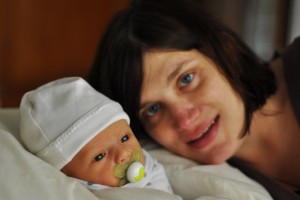Welcome to the Carnival of Evidence-Based Parenting! Our second carnival topic is New Parenthood.
A couple weeks after my son was born, new parenthood became an overwhelming reality for my husband and me. Both sets of our parents had returned to their homes. We were alone with a screaming infant who demanded constant feeding, changing, and burping. The effects of endless sleep deprivation were starting to hit us. Neither of us showered, ate properly, cooked, or was able to keep our clothes clean for more than five minutes. Laundry piled up. We argued constantly, nearly delirious with fatigue, our arguments illogical and fierce.
A dear friend of mine from my university came over to our apartment one Friday after work. She took one look at us — the bags under our eyes, our dirty clothes — and our apartment and its explosion of baby paraphernalia.
“Wow, this place really has that ‘new parent’ glow,” she said sarcastically. She stayed just long enough to hear a few minutes of my son’s nightly scream fest that began around 7 p.m. And then left in her cute, sporty car to watch movies, drink wine, read thick novels, and sleep in until 10 a.m. all weekend.
As I watched my unmarried, childless friend drive away, I sat by the window, weepy, and pleaded for her to hear my unspoken thoughts, Take me with you. Please. I want my old life back. I was once like you.
But those thoughts disappeared within the same hour as I watched my beautiful, perfect baby sleep, swaddled and content in his bassinet. I felt happier than I had been in my life.

Was this time — and the early years of parenting — going to be the most joyous of my life? Or would new parenthood — my son just turned two — made me miserable? What is “happiness” in the first place for new parents? And how in the world do you measure it — and the love, joy, frustration, and fear that goes along with the chubby baby cheeks, the sweet baby smell, and the cooing?
Anyone with even a casual acquaintance with the research on parental happiness should not be blamed for being confused. For years it’s been conventional wisdom in the media and in academia that parents are unhappier than non-parents. The media establishment, such as the widely dissected New York magazine article “Why Parents Hate Parenting,” frequently reports on the disastrous accounts of parenting on marital satisfaction, mental health, and life satisfaction.
By the time my son was born I had read enough of these doomsday articles to prepare myself mentally for the fact that parenthood would probably make me a bit anxious, depressed, stressed, exhausted, and, well, unhappy a lot of the time. This would be the lowest point of my marriage. I would weep a lot. I got it. Message received. Parenthood sucks a lot of the time.
But would I really be that unhappy?
It turns out there have been some serious flaws in previous parenting research on satisfaction and happiness. One of the most widely cited articles on parental misery is a 2004 article by economist Daniel Kahneman and his colleagues. They surveyed more than 900 working women in Texas, asking them to reconstruct the previous day’s activities and to describe their levels of happiness during each activity. Not surprisingly to anyone who has taken care of small children for hours at a time, child-care associated tasks did not get described as the most fun. (In fact, child care was rated lower than vacuuming. Is anyone surprised that parents were having less fun changing diapers than watching TV?)
What’s wrong with this study, and others like it that have been used to describe children as parasites of life satisfaction, gradually sucking the joy from our lives?
First, most of these studies did not directly compare parents to non-parents; rather, these studies would control for many complex demographic factors, often using sample data that was many decades old. For instance, many older studies did not account for how parenting satisfaction changes during each stage of parenting, from the newborn years to late adolescence and early adulthood.
Recent articles actually report on combined series of studies that use complementary methodological approaches to “triangulate” the data to better capture how parenting affects different groups of parents, the individual experience of one parent or family, and variations in perceptions across the lifespan.
Here are a few findings from that research that complicate the “parenthood is misery” picture:
1. The “happiness” of new parents actually spikes in the months before the birth of a child — as new parents wait, prepare and get excited — and then drops precipitously in the first year. Thus, comparing the happiness levels of parents pre-baby and post-baby is not a valid measure.
2. Older parents — particularly in their 40s and beyond — are actually quite happy. People who become parents at young ages have lower levels of satisfaction than older parents. This finding is thought to be associated with greater levels of socioeconomic security and emotional support.
3. Parents may feel differently after the birth of additional children. They report being happiest after the birth of the first child, slightly less happy after the second, and then describe no changes in happiness after the third child.
4. Parents overall are happier than their socioeconomically paired peers with no children.
5. Parenthood is best of all for dads. Fathers are happier than mothers, expressing higher levels of positive emotions and happiness than mothers, whose happiness presumably could be tempered by the biological changes of new motherhood and the increased responsibility in caretaking that women generally take on, compared to men.
For me, looking through this research, I’m more bewildered than ever. I’m not actually sure if this is an area where research studies can ever adequately ever capture the full range of experience and complexity of factors that impact a parent’s feelings about parenthood — or how that experience of parenting interacts with other areas of one’s life.
Parenting is hard, really hard. It can give your life tremendous meaning and joy but also drain you like nothing else. Let the researchers figure out the appropriate statistical modeling, but I want to say to new parents, you are not doomed to decades of toil, boredom, and misery. Life — with children, without them — is just so much more complicated than that. Maybe philosophers can provide us with better answers.
Has parenthood made your happier? Why or why not?
If you’re a new mom, we’d love to find out more about your experience. We invite you to take our new motherhood survey and tell us about how parenthood changed you.

Here’s a quick list of our contributors for this second edition of the Carnival of Evidence-Based Parenting:
The Transition to New Motherhood (Momma, PhD)
Bonding in Early Motherhood: When Angels Don’t Sing and the Earth Doesn’t Stand Still (Red Wine and Applesauce)
The Connection Between Poor Labour, Analgesia, and PTSD (The Adequate Mother)
For Love or Money: What Makes Men Ready for New Fatherhood (Matt Shipman)
What the Science Says (and Doesn’t Say) About Breastfeeding Issues, Postpartum Adjustment, and Bonding (Fearless Formula Feeder)
No, Swaddling Will Not Kill Your Baby (Melinda Wenner Moyer, Slate)
Sleep Deprivation: The Dark Side of Parenting (Science of Mom)
The Parenting Media and You (Momma Data)
Reassessing Happiness Research: Are New Parents Really That Miserable? (Jessica Smock)
40 Long Days and Nights (Six Forty Nine)
You can also “like” the Carnival of Evidence-Based Parenting on Facebook. Check out our Facebook page, and connect with all of us there!
Related articles

 Follow
Follow





